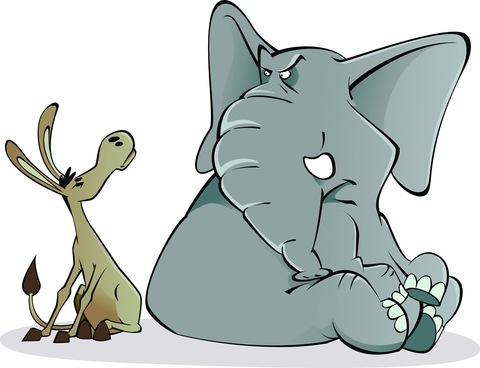The Republican Party (elephants) is stereotyped as more business-friendly. The stereotype says elephants favor a more limited size of government. They favor a smaller role of government in regulating the economy. But really, the important part is; they are in favor of regulating the economy.
The supposition is this includes supporting lower levels of regulation on business.
The stereotype does not match practice
Practice does not show this to be true. Many believe the elephants receive the support of business owners and investment capital. This assumes a more pro-business bias exists. The truth is, this is no longer true. The donkeys actually are taking in far more money from business. There is evidence from the most recent New Hampshire election. It shows the donkeys outspent the elephants 4:1.
The Democratic Party (donkeys) are said to rely more heavily on government intervention. They seek to influence the economy’s direction. They prefer to keep the profit motive of businesses at bay. If it were possible they would eliminate it. The important part is: donkeys favor government intervention to control the economy.
How to grow government
With their higher regulation come increased costs. Donkeys support higher costs with higher taxation. The party is often described as “tax and spend.” Their belief is businesses are focused on earning a return for shareholders. Therefore businesses are willing to cut corners in terms of protecting social good. Donkeys are assumed to be supported by labor and environmental interests. The truth is, this is no longer strictly true either.
During economic downturns, Democrats are Keynesian. They espouse the belief deficit spending is necessary to help stimulate the economy. If private business prospects improve they don’t actually care. They do care if their ability to collect additional taxes is diminished.
Acquiring power and retaining power
The donkeys have learned, if they stay in power, they can change the tax laws. Control of tax law is necessary to effect the redistribution of wealth. They can shape the redistribution as they fancy as long as they remain in power. The elephants are slower on the uptake on this point. But they are getting it. The sad truth is both parties want what is in their best interest, not ours.
Influencing government spending levels is referred to as fiscal policy. Donkeys constantly look to enhance and extend welfare programs. They sell these positions as helping citizens. Citizens who have lost their jobs need help. They sell the position these citizens are more in need. It is obviously due to the challenging economic conditions.
Currently, nearly half of all people in the country have an effective tax rate of zero. In truth, the Donkeys are buying their votes. They buy votes because votes are useful in acquiring power. They strive to create a self-sustaining system where victims advance. Punishment comes with self-sufficiency and independence. The elephants, not to be outdone, are using the same tools. We are in a dangerous spiral.
Conclusion
We are witnessing the promotion of the ideology of socialism. Socialism is: From each according to their means; to each according to their need. It sounds noble. But it is a motivation killer. It means if you produce more you must give up more. You do not benefit from your ingenuity, industry or insight.
Because we are all equal, we should all have the same, right? That’s only fair… right? Well no, actually what needs to be equal is the opportunity. Results are seldom the same. They never have been, likely never will be. Donkeys and Elephants and Economies, Oh, my!
